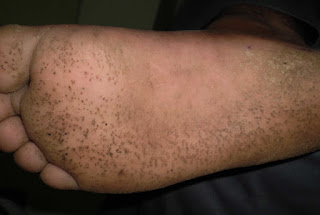Robert Zakar gives back to community
Understanding Varicose Veins -- Treatment
A mild case of varicose veins does not usually require a doctor's care. You can find relief from the discomfort of varicose veins with basic at-home treatment and various alternative remedies.
Superficial varicose veins normally do not require medical attention, but they should not be ignored. To relieve the discomfort, your doctor may recommend the following:
Compression stockings, which you can buy in most pharmacies and medical supply stores. Over-the-counter stockings include the support panty hose offering the least amount of pressure and the compression hose offering more pressure. Higher-pressure compression stockings provide the most pressure and require a prescription. Compression stockings are designed to help your leg muscles push blood upward by providing graduated compression with the strongest support starting at the ankles and gradually decreasing upward. Put them on before you get out of bed in the morning. Raise your legs in the air and pull the stockings on evenly; they should not feel tight in the calf or groin. You should wear them all day and also elevate your legs for 10-15 minutes several times throughout the day.
Over-the-counter anti-inflammatory drug such as aspirin or ibuprofen to alleviate occasional swelling and pain.
If you notice skin around a varicose vein becoming ulcerated or discolored, or if you have continuing pain with no obvious outward signs, contact a doctor at once about the possibility of deep vein involvement.
Medical Procedures
Most varicose veins do not need to be removed. If particularly bothersome, varicose veins can be eliminated by one of several methods:
Unfortunately, no treatment can prevent new veins from becoming varicose. Before pursuing a particular treatment, discuss all options with a dermatologist or vascular surgeon.
PCOS: Symptoms, Causes And Treatment
Commissions we earn from partner links on this page do not affect our opinions or evaluations. Our editorial content is based on thorough research and guidance from the Forbes Health Advisory Board. Table of Contents{{ tocState.ToggleTocShowMore ? 'Show more' : 'Show less' }}
Polycystic ovary syndrome (PCOS) is the most common endocrine disorder among women of reproductive age, impacting 5% to 10% of premenopausal women . While the condition can result in serious complications and long term health effects, there are treatments available to help manage symptoms.
Here's what you should know about living with PCOS and finding the right treatment for you.
What Is PCOS?PCOS is a condition affecting as many as five million U.S. Women in their childbearing years . While there is no definitive cause, the ovaries and adrenal glands of women with PCOS produce more male hormones than what is considered normal. This results in a range of symptoms including acne, excess facial hair, weight gain and infertility.
"[PCOS] begins at puberty in most cases, and will almost always appear by the mid-twenties," says Yen Tran, D.O, an OB-GYN at MemorialCare Orange Coast Medical Center in Fountain Valley, California. "This is an affliction of young women and left untreated, its effects will last a lifetime."
Beyond reproductive age, women with PCOS have a greater likelihood of developing a number of health issues, and the risk of complications increases if they are overweight or obese. These conditions, according to the Centers for Disease Control and Prevention (CDC), include:
You May Also Be Interested In Supplements For Women From Our Featured Partner
Essential For Women Multivitamin 18+
Essential For Women Multivitamin 50+
Essential For Teens Multivitamin For Her
Essential Duo Women 18+
Essential Duo Women 50+
The root cause of PCOS may be tied to a combination of insulin resistance (which is when your body can't use insulin effectively), irregular menstruation and excess male hormones, according to the American College of Obstetrics and Gynecology (ACOG). There may also be a hereditary link, as people with a mother, sister or aunt diagnosed with PCOS are at a higher risk of diagnosis themselves.
Symptoms of PCOSPCOS is one of the most common causes of female infertility, according to ACOG. Other symptoms associated with PCOS can include:
There is no definitive test to diagnose a patient with PCOS, says Erika Munch, M.D., a reproductive endocrinologist at the Texas Fertility Center in San Antonio. Rather, she describes diagnosis as one of exclusion, "meaning many other things can masquerade as PCOS."
"With a thorough medical history and a few well-chosen tests, a reproductive or medical endocrinologist or OB-GYN can accurately diagnose the condition," she says. "Some of these tests include bloodwork to look at hormone levels and a pelvic ultrasound to evaluate the ovaries."
Treatments for PCOSAs there is no cure for the condition, treatment for PCOS is all about managing symptoms.
The treatment largely depends on a patient's stage of life and their hopes for their reproductive future, adds Dr. Munch, and can include the following:
"Women who have PCOS can produce high levels of androgens (like testosterone) which can interfere with the development and release of mature eggs," says Dr. Munch. Without releasing eggs reliably, it can be difficult to time intercourse for a high chance of conceiving, she says.
But women with PCOS are not without hope—with the right help, most patients can get pregnant successfully, Dr. Munch adds.
If you have a PCOS diagnosis and are newly pregnant or hoping to conceive, it's imperative you work closely with your health care provider to monitor your health and that of your developing fetus.
Pregnant people with PCOS are at greater risk for developing preeclampsia, a serious pregnancy complication, and delivering a preterm infant. Additionally, PCOS may double the risk of developing gestational diabetes, and increase the risk of complications at delivery and birth.
When to See a DoctorAs to when women should seek medical help about a potential case of PCOS, the answer is immediately, says Dr. Tran. "Younger women should not be suffering in silence," she adds. Women with irregular menses or other signs of PCOS who are trying to conceive should speak with a board-certified fertility doctor right away to discuss their treatment options. With the right care, women impacted by this condition can alleviate symptoms, increase the likelihood of pregnancy and improve their overall quality of life.
Day Treatment
Teenscope is a daily treatment program for teens ages 12–18 that assists in:
When appropriate, we also address chemical dependency issues.
The treatment team includes board certified child/adolescent psychiatrists, psychologists, social workers, expressive therapists, an education specialist, as well as an addiction specialist, when appropriate. Together, with the patient and their family, the care team creates an individualized treatment plan.
The adolescents are evaluated for medication needs and participate in a psychoeducational assessment and additional psychological testing to provide the best course of treatment.
Teenscope includes a fully accredited education program allowing patients to earn credit toward graduation. The education specialist serves as a liaison to the patient's school and provides advocacy and coordination when the student returns to their school.



Comments
Post a Comment